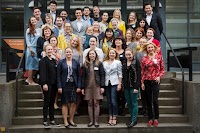In 1896, Henri Becquerel decided to investigate the x-rays that Wilhelm Röntgen had discovered at the end of the previous year. He deduced an experiment to test his theory that phosphorescent materials absorbed sunlight and then emitted it in the form of x-rays. He wrapped photographic plates in heavy cardboard to prevent their exposure to sunlight. Onto these plates he placed some fluorescent potassium uranyl sulfate crystals with coins and cut metal shapes between the crystals and the wrapped plates.
He left the experiment out in the sunshine and when he developed the plates he saw the outlines of the coins and metal shapes. Thinking that the experiment had proven his theory he presented his initial findings at the Académie des sciences. Nevertheless, he wanted to confirm his theory with further experimentation but several days of overcast conditions in Paris resulted in him leaving the experimental materials in a drawer.
On 1st March 1896 he decided to develop the photographic plates anyway, expecting to see only faint images. To his surprise he saw very clear images of the metal shapes. During a meeting of the Académie held the next day he explained that the uranium salts emitted a radiation without the influence of sunlight.
In further experiments with other non-phosphorescent uranium salts he found the same results and concluded that the element uranium emitted a new form of radiation. His discovery inspired the husband and wife team of Pierre and Marie Curie to conduct further research into radioactivity. In 1903 the Curies and Becquerel jointly received the Nobel Prize in Physics.






Post a Comment
EmoticonClick to see the code!
To insert emoticon you must added at least one space before the code.